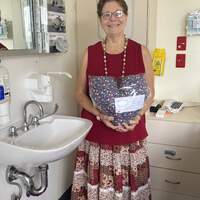“What About Amiodarone for Atrial Fibrillation After Heart Valve Surgery?” asks Claudia
Written By: Adam Pick, Patient Advocate, Author & Website Founder
Medical Expert: Douglas Johnston, MD, Chief of Cardiac Surgery at Northwestern Medicine
Published: January 10, 2023
As many patients in our community have experienced, a common complication after heart valve surgery is atrial fibrillation (AFib). Symptoms of AFib may include an irregular heartbeat, palpitations, extreme fatigue and chest pain.
To help treat AFib following heart surgery, patients may be prescribed Amiodarone, an anti-arrhythmic drug. However, many patients have ongoing concerns both about AFib and Amiodarone. For example, Claudia just asked me, “Hi Adam, I had mitral valve repair surgery two weeks ago. I had an atrial fibrillation episode after the operation. What is the usual amount of time patients stay on Amiodarone?”
To answer Claudia’s question, I connected with Dr. Douglas Johnston, the Chief of Cardiac Surgery at Northwestern Medicine. During his career, Dr. Johnston has performed over 3,000 heart valve surgeries. In our community, Dr. Johnston has successfully treated many patients including Kim Clemmons and James Wright.
Key Learnings About Atrial Fibrillation & Amiodarone
Here are key learnings from Dr. Johnston’s interview about Amiodarone and atrial fibrillation:
- Approximately 15% to 25% of patients may experience atrial fibrillation after heart valve surgery, according to Dr. Johnston.
- AFib typically goes away a few weeks after surgery. “The good news is that AFib usually goes away in the first few weeks,” states Dr. Johnston. “AFib peaks at about 10 days… Then, AFib declines pretty steeply out to about six to eight weeks.”
- Amiodarone is prescribed after surgery to help reduce the AFib burden and to lower the heart rate of patients.
- Patients may stop using Amiodarone when their medical team deems it advisable. According to Dr. Johnston, “Patients be rechecked at some point in time between 6 and 12 weeks after surgery. If you’re in a regular rhythm at that point, and you don’t have other reasons to be on Amiodarone, usually we can stop those medications at that period of time. Chances are this is a short-term plan.”
- There is no definitive reason why patients get atrial fibrillation after heart valve surgery. Dr. Johnston states, “AFib is something that we have struggled with as surgeons and cardiologists for years. It likely is related to the fact that the atrium is very sensitive to inflammation. Any time we operate on the heart, the outside of the heart is a little irritated. That irritation can trigger these episodes of atrial fibrillation. As your heart heals and the inflammation goes down, the incidence becomes much less.”
- According to Dr. Johnston, AFib is typically a “temporary annoyance” after heart surgery and is not a “long-term problem.”
Many Thanks Dr. Johnston & Northwestern Medicine
Many thanks to Dr. Johnston for taking the time to educate our patient community about atrial fibrillation, Amiodarone and heart valve surgery. We also want to thank the entire Northwestern Medicine team for taking such great care of patients from the HeartValveSurgery.com community!
Related Links:
- See Dr. Johnston’s Interactive Surgeon Profile
- Explore the Northwestern Medicine Heart Valve Microsite
Keep on tickin!
Adam
P.S. For the deaf and hard of hearing members of our community, I have provided a written transcript of my interview with Dr. Johnston below.
Video Transcript:
Adam: Hi, everybody. It’s Adam with heartvalvesurgery.com. Today we’re answering your questions all about atrial fibrillation and the use of Amiodarone after heart valve surgery. I am thrilled to be joined by Dr. Douglas Johnston, who is the Chief of Cardiac Surgery at Northwestern Medicine in Chicago, Illinois. During his extraordinary career, Dr. Johnston has performed over 4,000 cardiac procedures, with more than 3,000 involving some form of heart valve repair or heart valve replacement. Dr. Johnston, it is great to see you again. Thanks for being with us today.
Dr. Johnston: Adam, it’s great to be here. Look forward to talking.
Adam: Dr. Johnston, we’re answering patient questions. We got a great one that just came in hours ago from Claudia. She asks, “Hi Adam, I had mitral valve repair surgery two weeks ago. I had an atrial fibrillation episode after the operation. What is the usual amount of time patients stay on Amiodarone?
Dr. Johnston: Great question. That really depends, Claudia, on how your a-fib is doing. The good thing is that while a-fib is pretty common after a valve surgery – depending on the type of operation, 15 to 25% of patients will have early a-fib – the good news is that that usually goes away in the first few weeks. It peaks at about 10 days, so you’re in that window. Then it declines pretty steeply out to about six to eight weeks.
Most often, what will happen is the Amiodarone is used early to help control your a-fib, reduce the a-fib burden, and to lower your heart rate. Then you’ll be rechecked at some point in time between 6 and 12 weeks after surgery. If you’re in a regular rhythm at that point, and you don’t have other reasons to be on Amiodarone, usually we can stop those medications at that period of time. Chances are this is a short-term plan. I would discuss that with your surgeon and cardiologist. Usually, this is not something you’ll need to be on for the long-term.
Adam: Dr. Johnston, a quick follow-on. I’m sure patients in our community are wondering, why do I get a-fib after heart valve surgery?
Dr. Johnston: Adam, that one is a tough question, and no easy answer. A-fib is something that we’ve struggled with as surgeons and cardiologists for years. It likely is related to the fact that the atrium is very sensitive to inflammation. Any time we operate on the heart, the outside of the heart is a little irritated. That irritation can trigger these episodes of atrial fibrillation. As your heart heals and the inflammation goes down, the incidence becomes much less.
Post-operative atrial fibrillation is a very different beast than atrial fibrillation that comes up out of the blue – still not very well understood. There are lots of studies going on to see how we can reduce that incidence. Fortunately for most patients, it’s a temporary annoyance. It’s not a long-term problem.
Adam: Claudia, I hope that helped you. I know it helped me. Dr. Johnston, on behalf of the patients at heartvalvesurgery.com, patients all over the world watching this video, I want to thank you for taking time away from your very busy practice there at Northwestern Medicine in Chicago, Illinois. Thanks for being with us today.
Dr. Johnston: Adam, thanks a lot for the opportunity. We wish Claudia the best.




